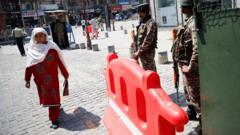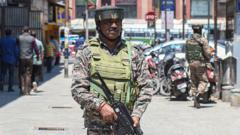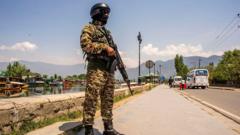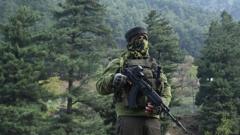In the wake of a deadly militant attack in Kashmir, India and Pakistan find themselves at a crossroads, grappling with the need for both escalation and restraint in their complex relationship.
India-Pakistan Relations: Navigating Crisis and De-escalation
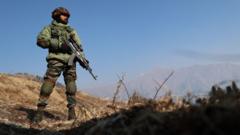
India-Pakistan Relations: Navigating Crisis and De-escalation
An examination of recent tensions between India and Pakistan and their historical approaches to resolving conflict.
In recent days, India and Pakistan have found themselves embroiled once again in a cycle of crisis following a terrorist attack in Pahalgam, Kashmir, that resulted in the loss of 26 civilian lives. This incident has reignited an atmosphere of tension reminiscent of previous episodes in their fraught history, marking a concerning escalation in a long-standing conflict still centered on territorial disputes and security issues.
The pattern of crisis followed by de-escalation is not new for these two nuclear-armed neighbors. In 2016, the assault on Indian soldiers in Uri prompted India to conduct "surgical strikes" across the Line of Control, targeting what it claimed were militant bases in Pakistan. Similarly, the 2019 Pulwama bombing, which killed 40 paramilitary personnel, led to aerial strikes in Balakot, marking India’s first military incursion into Pakistan since 1971, triggering a rapid series of retaliatory measures and diplomatic maneuverings.
Historically, each major attack has involved accusations from India directed at Pakistan regarding its alleged support for militant groups, claims that Pakistan has steadfastly denied. According to Ajay Bisaria, India's former high commissioner to Pakistan, the most recent attack deviates from prior events in that it directly affected civilians, echoing the horrors of the 2008 Mumbai attacks.
In the aftermath, India has acted swiftly, implementing measures such as closing key border crossings, suspending water-sharing treaties, and expelling diplomats. According to military analysts, these actions are indicative of India's strategy to balance a show of strength while avoiding open conflict.
Pakistan's response has mirrored India's, as it suspended a peace treaty and halted visa issuance to Indian nationals, raising tensions further along an already risk-laden border. The historical context of their rivalry, particularly centered around Kashmir, remains a significant factor in shaping responses.
As both countries navigate this renewed period of hostility, the decision-making landscape has shifted. Past experiences have shown that immediate retaliation can escalate into significant military encounters. Conversations between military leaders and a dedicated hotline between forces are mechanisms designed to facilitate communication amidst heightened tensions. Historically, these channels have been crucial in preventing miscalculations that could lead to warfare.
Lessons gleaned from previous crises indicate a dual instinct to escalate and de-escalate. While immediate punitive measures resonate with public sentiment, long-term strategies often call for restraint and diplomatic overtures. Observers like Bisaria suggest that a "de-escalation instinct" may also surface alongside the push for escalated military responses. Even as India contemplates tougher measures against Pakistan, including potential changes to water-sharing agreements, the prospect of renewed dialogue remains essential.
As tensions escalate, might both nations find a way to revive diplomacy or will the cycle of violence repeat yet again? The need for balance and thoughtful response strategies will be paramount in determining the stability of the region.
The pattern of crisis followed by de-escalation is not new for these two nuclear-armed neighbors. In 2016, the assault on Indian soldiers in Uri prompted India to conduct "surgical strikes" across the Line of Control, targeting what it claimed were militant bases in Pakistan. Similarly, the 2019 Pulwama bombing, which killed 40 paramilitary personnel, led to aerial strikes in Balakot, marking India’s first military incursion into Pakistan since 1971, triggering a rapid series of retaliatory measures and diplomatic maneuverings.
Historically, each major attack has involved accusations from India directed at Pakistan regarding its alleged support for militant groups, claims that Pakistan has steadfastly denied. According to Ajay Bisaria, India's former high commissioner to Pakistan, the most recent attack deviates from prior events in that it directly affected civilians, echoing the horrors of the 2008 Mumbai attacks.
In the aftermath, India has acted swiftly, implementing measures such as closing key border crossings, suspending water-sharing treaties, and expelling diplomats. According to military analysts, these actions are indicative of India's strategy to balance a show of strength while avoiding open conflict.
Pakistan's response has mirrored India's, as it suspended a peace treaty and halted visa issuance to Indian nationals, raising tensions further along an already risk-laden border. The historical context of their rivalry, particularly centered around Kashmir, remains a significant factor in shaping responses.
As both countries navigate this renewed period of hostility, the decision-making landscape has shifted. Past experiences have shown that immediate retaliation can escalate into significant military encounters. Conversations between military leaders and a dedicated hotline between forces are mechanisms designed to facilitate communication amidst heightened tensions. Historically, these channels have been crucial in preventing miscalculations that could lead to warfare.
Lessons gleaned from previous crises indicate a dual instinct to escalate and de-escalate. While immediate punitive measures resonate with public sentiment, long-term strategies often call for restraint and diplomatic overtures. Observers like Bisaria suggest that a "de-escalation instinct" may also surface alongside the push for escalated military responses. Even as India contemplates tougher measures against Pakistan, including potential changes to water-sharing agreements, the prospect of renewed dialogue remains essential.
As tensions escalate, might both nations find a way to revive diplomacy or will the cycle of violence repeat yet again? The need for balance and thoughtful response strategies will be paramount in determining the stability of the region.








